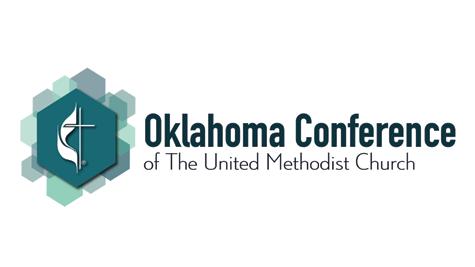So

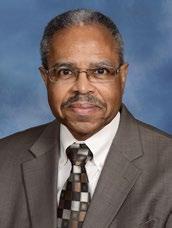
Joe Harris Director of Communications
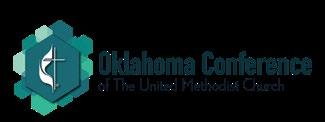
Communications Ministry Staff

Andrew Himes
Multimedia and Web Ministry
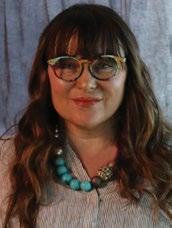
Jena Barber Editor of Publications

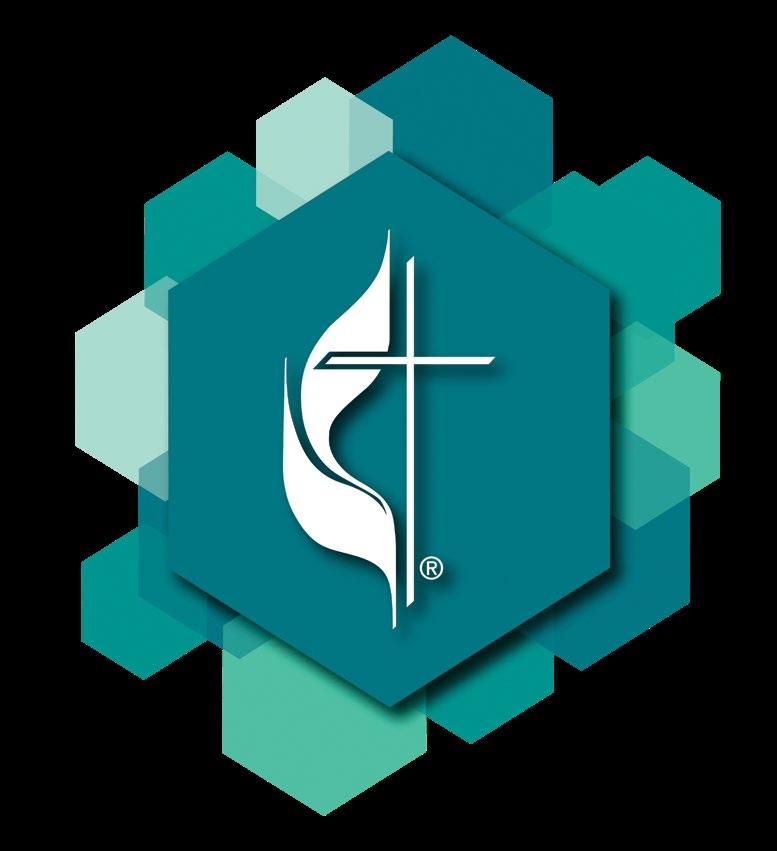
POSTMASTER:
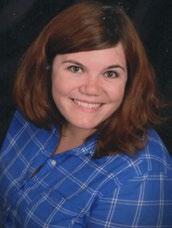
Tabitha Beckman Communications Specialist
Publication Credits
Young People Slang Interpreter
what it means
Banger
Bougie

used in a sentence
karen
ok boomer
oof
gatekeep serve rizz
yeet sus shook
fancy, wealthy, materialistic
what you’re into right now fashion lie
something that’s awesome act exclusively brag
That Lauren Daigle song is a real banger.
Oh, you’re dressing all bougie for church? Okay then.
No cap, this potluck chicken is my new favorite!
This is your “learning new things” era. You’ve got that drip up there on stage with the choir.
I don’t mean to flex, but Jesus loves me best.
No need to gatekeep. Everyone is welcome at our church.
Karen over there thinks our kind of people shouldn’t be allowed in church.
charisma, personality yikes, like when someone does something totally boneheaded what you say to a gatekeeping Karen
someone who complains and gatekeeps suspicious shocked look good
throw something away, as if it’s on fire
Oof, you really said that. I’ll bet you’re embarrassed. OK, boomer. You are so obsolete right now.
The youth pastor really has that rizz. Look how she makes them laugh.
The lead singer is serving right now in her fringed dress.
That old guy trying to wear skinny jeans is sus. I’ve been so shook since I learned we’re getting a new pastor.
You really need to yeet your outdated ideas about diversity and inclusion.
Intellectual growth should commence at birth and cease only at death.
- Albert Einstein
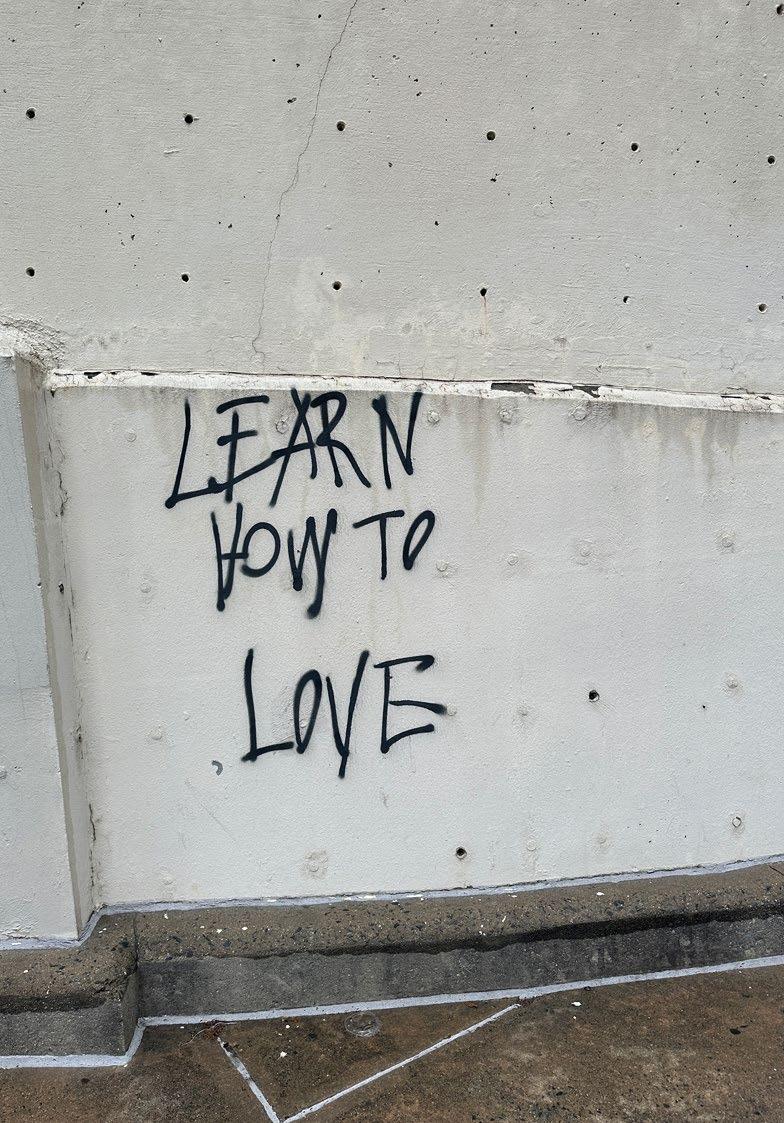
Whoever humbles himself
Whoever humbles himself
By Jena Barber By Jena Barber
I am still learning. ― Michelangelo, at age 87
When standing in church, praying or singing, we often see people praying with their hands out, palms open. Many have said this is a way to show that we are ready to receive a blessing. They say you can’t receive a blessing with a clenched fist.
When talking with young adults, it can often feel as if we should bestow upon them our greater knowledge and wisdom, which we have earned through decades of hard work and perseverance, and maybe even suffering. It can seem too easily won for those young people to be in a position to teach us, when they haven’t had to go through the life lessons the world taught us. That thinking is all too prevalent in today’s churches.
When a young person tells us there’s a better way, we clench our fist.
When a young person wants us to try something again, which we tried before and it did not work, we clench our fist.
When a young person says we are being close-minded, our fingers turn white from the clenching. Do they not know how open our minds have been? Do they not see the fights for civil rights, for women’s rights, for freedom? We have already learned so much. What is it that they think they can teach us? They’re so young. They haven’t even lived yet.
Maya Angelou famously said, “Do the best you can until you know better. Then, when you know better, do better.”
Young people have lived their lives immersed in digital media. Not only does this give them the capacity to learn at an astonishing rate – especially about social issues – but it opens them up to the entire world. Where older adults had to travel to see diverse perspectives, young people can learn about diverse traditions, immerse themselves in multiple languages, and peruse first-hand accounts of varying cultures – all with a handheld device that they’ve had since childhood.
While we might make fun of a young person for always being attached to their cell phone, most of us would be lost – literally and figuratively – without ours. The difference is, we see it as a tool or a luxury. They don’t know a world without it.
That access to knowledge and differences creates young adults who are uniquely positioned to speak out and speak up for diversity, equity, and inclusion.
Sometimes, that speaking up can almost sound like whining or complaining. What we’re hearing, if we listen closely, is the sound of progress. It’s the sound of change. It’s the squeaky wheel, begging for grease.
If we open our hands, palms up, and wait for the blessing, we might be surprised at what young people can teach us.
How can I learn from young people?
Hold a listening session
Invite young people to speak to your church or small group. Give them a list of questions, and let them answer them. Vow to not speak or offer opinions during this time. Use duct tape if necessary. After the listening session, spend some quiet time in prayer. Meet with your group for a follow-up. Email questions to the young people if clarification is needed. Use the experience for growth.
Give young people leadership positions
Do you have young representation on your important boards and committees? What is the average age of your congregation? What is the average age of your leadership? Adjust as necessary. When you give a young person a leadership role, let them lead.
Ask a young person to mentor you
This can be very difficult. For them. Though it’s very hard to learn from a younger person, it’s equally hard to try and teach someone with so much more life experience than you have. Give the young mentor grace. Let them teach you things without judging or questioning them. Try on their opinions. Ask yourself hard questions, like why. Why have you always done it this way? Why do you have that opinion? Why do they feel so strongly about this topic?





Who are young adults, anyway?
Studies are being done, responses are being collected, and demographics are being tallied. Young adults across the world are being surveyed, surveiled, questioned, and quoted. Churches all want to know the same thing: How do we reach young adults?
For churches to stay relevant - and to survive the coming decades - young people must be part of their congregations. The problem is, aging congregations don’t know what young people want. Often, they don’t even know what to call young people. Are they millennials? Are they Gen Z? Are they zoomers? Are they Zeelennials? Did we just make up a word?
In the United Methodist Church, the answer is: Yes, all of the above. Youth is relative.
Typically, young adults are ages 18 to age 35, with the top age moving upward depending on the church context. With aging congregations, whose average age is 57 at the last accounting more than a decade ago, a 40-year-old can seem very young, relatively speaking.
The young adult age category includes adults from the Gen Z and millennial generations.
One important note about Gen Z adults is that they are the first generation to be born into a “post-Christian” culture in the US. According to a Barna Trends 2018 study, only 36 percent of Americans believe that churches are acting in their best interests. The same poll notes that a quarter of Americans do not trust pastors to accurately describe issues facing today’s Americans.
Thirteen percent of Gen Z adults identify as atheists, while only five percent of Baby Boomers claim the title. Of non-Christians polled, the top responses were, “I have a hard time believing that a good God would allow so much evil or suffering
in the world;” “Christians are hypocrites;” and “I believe science refutes too much of the Bible.”
Gen Z respondents cited, as their top reasons for not attending church, that “church is not relevant to me” and “I can find God elsewhere.”
While Gen Xers were mollified with “rock and roll” church and play options like skateboard parks, church-hosted arcades and lock-ins, and millennials brought coffee bars and bookstores into church lobbies, members of Gen Z need something they can’t get by using an app on their smart phone.
Today’s world is also considered a “posttruth” society. Barna found that 44 percent of Americans believe that moral truth is relative. If Gen Z adults are told in a church setting that there are rigid rules of morality, they might not stay long enough to hear the Doxology.
For churches to be relevant in the lives of young people, who by simple mathematics make up the entire future of the church, they must learn from those very young people.
Young people care. A lot. They care about social justice, they care about diversity and inclusiveness, and they care about whether you care - or are at least willing to listen.
Listening to the voices of young adults is step one. Step two is to act accordingly.
As the old saying goes, actions speak louder than words. Congregations that wish to include young adults in their constituencies must allow those same young adults to shape the future of the church.
Read on for advice, resources, and ideas for bringing young adults into the fold of your church - that is, if that is, in fact, what you really want to do.
TIPS FOR STAYING RELEVANT IN THE 21ST CENTURY
To be relevant is to survive. To survive is to be useful to people in the present context. It is to be something people want, need, or love. Being relevant is not something that “just is.” It is something to strive for, to cultivate. In order to be relevant, there are things each organization - in this case, each church - should do.
This does not mean you have to change your values or your ethics. What this means is that you must look inside yourself and find out what it is that you have to offer the world that, in 20 years, the world will be willing to accept.
We asked some of our most relevant adults for their take on staying relevant in today’s society.
Be open to new ideas.
Rev. Levi Duggan: Jesus often said, “you have heard it said but I say to you...” We take for granted that Jesus is helping us see the old way of understanding was mistaken. He goes so far as to say religious people’s interpretation of Scripture was even mistaken! Jesus commends us to be open to new things God wants to do.
Kathryn Witzel: Stay current on technology, even if younger people think you’re “cringe” (another to add to the translator).
Question everything.
Kathryn Witzel: Do not share every thought you have, but ask for their opinions and listen. Follow up with honest questions, not a defense of your long held belief. If someone’s behavior or presence makes you uncomfortable, examine yourself and find out why you are feeling that way. Does it challenge your worldview? Is that coming from a place of privilege? Even honest, thoughtful questions will sometimes be met with anger or defensiveness. That is OK and not a reason to shut down.
Reframe your value propositions.
Kathryn Witzel: Be in a consistent relationship with people older and younger than you outside of your family. Both ends of the spectrum have valuable lessons to teach. Resist the urge to silo age groups and life stage groups. Get lay people involved in all elements of church life, especially worship. Allow room for mentoring in casual, safe settings. Side by side ministry provides an opportunity for relationships to form. It takes time.
Understand that the young are thought leaders.
Rev. Levi Duggan: Sometimes the best ideas and the biggest dreams come from those who haven’t been made cynical by experience. Just because you tried something similar in the past doesn’t mean God isn’t ready to do a new thing today.
Be prepared for tough questions.
Rev. Levi Duggan: Remember, you are the older adult! You have the position to be patient, thoughtful, and calm in leadership. It does young people no good to see the elders panic. Listening thoughtfully and letting young people feel their way along without your fear is a powerful way to ensure they will come to you when they need advice.
Be honest.
Jena Barber: Young people are excellent critical thinkers. They can spot confirmation bias, straw man arguments, and other logical fallacies and cognitive biases a mile away. They’re also extremely sensitive to hypocrisy.
Lead with love.
Rev. Levi Duggan: There is a famous meme that
says, “You interpret what love is by the Scriptures, but I interpret the Scriptures by love”. What lens you use to understand God and the Bible are critical. The very best lens for reading Scripture is Jesus Christ. If he speaks to it, interprets it, or gives us a higher law, we must obey.
Be teachable.
Rev. Levi Duggan: I often think I know it all. I have been through a lot, and held a lot of roles and leadership positions, and sometimes it’s easy to think, because of all that, I am the smartest person in the room. The problem is, experience doesn’t always equate to wisdom. Many young people are given the gift of wisdom, and we should listen!
Make new traditions.
Rev. Jack Terrell-Wilkes: Theologian Jaroslav Pelikan said, “Tradition is the living faith of the dead, while traditionalism is the dead faith of the living.” The essence of tradition is maintaining an open dialogue with the past while keeping in mind the present moment. God is still speaking. We need to discern the spirit’s prompting. I like tradition with a twist. Like an organ/DJ duet. Like a classic hymn with modern arrangements (David Crowder’s Doxology). I started wearing a clergy collar when I heard of a seminary friend who went to an area of Atlanta, GA, known for its tattoo parlors and bars, wearing his collar, while handing out provisions to local youth. That is tradition with a twist in a modern context.
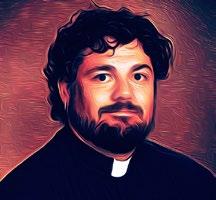
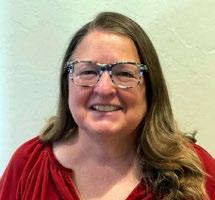
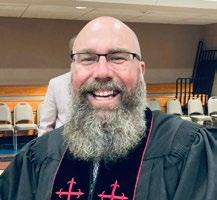
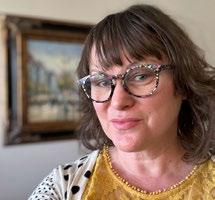
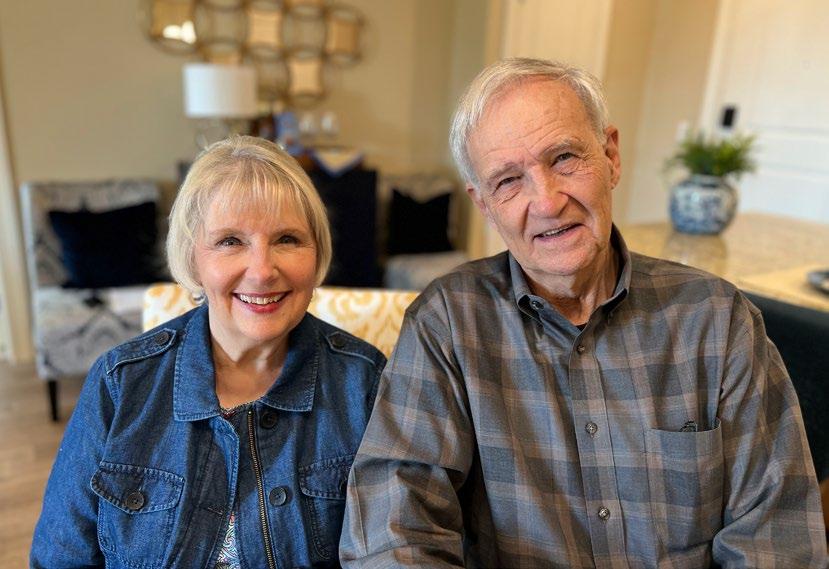
“WE LOOKED AROUND BUT KEPT COMING BACK. EPWORTH WAS IN OUR HEARTS.”
LIFE AT EPWORTH VILLA IS ALL ABOUT FREEDOM from home maintenance hassles and chores, and from worrying about future needs. And like the Potts, who are retired Methodist ministers, you might just find your freedom here at Epworth Villa too. We have beautiful cottages and apartments designed to fit a range of lifestyles and budgets, and the peace of mind of LifeCare is available no matter what home you choose. Come experience how great it is to live life your way, every day, at Epworth Villa.
Meet Our ImpactOK2 Residents
There is an obvious gap in ages among churches across Oklahoma. Missing from the pews are adults in the age range of 18 to 35.
ImpactOK2 is a two-year residency at local churches focusing on the gap between where churches want to be, with regard to young adults, and their capacity to reach new people with an often dwindling staff.
Joint funding from the local church and the conference legacy fund provide each young
adult resident with a full-time salary while they are with the church. The ImpactOK2 resident will then work with the church to connect with young people in that church’s community through ministry, outreach and other opportunities.
This class of ImpactOK2 residents completes their two-year residency July 31 of this year. If you’d like to know what they’ve learned from their experiences, read on.
I’m Hannah Thompson and I am a resident with the IMPACTOK2 program. I’ve lived in Tulsa for the past four years but I grew up mostly in Windsor, Colorado. I currently work as the director of youth and young adult ministries at Verdigris United Methodist Church.
There is a noticeable, generation-sized gap in the church and the purpose of IMPACTOK2 is to figure out why that is and to see if we can fill it. Without the young adults growing in the church, there is no growing of the church.
So what’s the solution? Creating spaces in the church and outside the church that allow young adults to be themselves and feel at home. I started with a simple small group. At first, back in September of 2022, we only had four young adults show up. Now, I have anywhere from six to 14 on a weekly basis. We meet at 8 p.m., every Tuesday night, in my home.
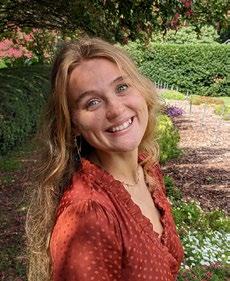
I plan women’s brunches every quarter and they are going very well. Women of all ages join us for breakfast and punch. Through this I’ve learned that it’s important to look at the community demographic as well as the church demographic. When you see who’s in your community, you know who your events should be catered toward. We have a lot of families in our community, so planning family events is where we find a lot of success. Planning events for the women of the church is where I find the best opportunities to invite other young women to join us.
Hannah Thompson
I believe that hosting this small group in my home was a key part of the success of the group. We started off using the Home Group model created by Adam Shahan. We would start the evening asking, “How is it with your soul?” and then we’d discuss one of the 22 Holy Club questions for self-evaluation.
Impact OK2 Resident at Verdigris United Methodist Church.
This proved to be very successful at getting young adults to open up and connect with the group. Now we ask, “how is it with your soul?” and see where the conversation goes from there. Once a month we do some sort of outing or we have a game night. This small group has been my favorite and the most successful part of my job. God’s kingdom is grown in many different ways, using many people’s different strengths.
There have been many events that I planned as well as programs I’ve attempted to start. Some were failures and some have been very successful. I planned a bonfire worship night a little over a year ago. I invited over 15 different churches in my district and three showed up, one of which was the local Baptist church. I wouldn’t necessarily consider this a failure, but it did not work out the way I thought it would.
I’m not trying to change my church to fit only what young adults want. I’m working to create space for them. The best advice I can give to attract young adults is to speak their language and answer their many, many questions. Have information about your young adult and youth programs on your church website. Young adults love to be able to see what’s going on at your church on their phones.
Regularly post on and update your website and social media. That’s how a lot of young people find their next church.
Young adults have a lot of doubts. According to the PEW Research center, Gen Z is the nation’s least religious generation EVER. So, when they attend church, they want to ask questions. Uncomfortable questions. Difficult to answer questions. For hundreds of years the church has avoided a lot of these uncomfortable questions, responding with “Just have faith. Jesus doesn’t want you to doubt.” Well, now we are seeing what it looks like for a generation to refuse to accept that answer: They leave.
We need to provide spaces in churches for these young adults to be able to ask their questions and get real answers. A place that they feel safe to talk about what they’ve been through and what they believe without being immediately shut down. They just need a few old couches and someone who cares for them.
My name is Diandra Nelson, and I’m from Southside OKC. I Grew Up In Broken Arrow. I’m 26 years old. I am the director of Young Adult Ministries at St. Matthew UMC in Midwest City.
I have over a decade of church work experience. I’ve been working in a church since I was 14! I also have experience planting a church and that has been invaluable to me as I have navigated my ImpactOK2 work.
I have really enjoyed all of the work I’ve been able to do in the ImpactOK2 program but I think the shining success of my program has been starting D&D on Friday nights! Seventeen of us meet up every Friday and play Dungeon & Dragons in the church parlor. It’s served as a way for people who are uncomfortable with the church or just getting back in it to step into the church building and spend time with me outside of a classical pastoral role.
I have a natural inclination to fall into old-school ministry models - things like Sunday School and traditional Bible studies. Those things are extremely important but I have found that they can’t come first. I have found that people do not care what you know until they know that you care. A lot of my time has been spent doing nontraditional ministry work, spending time with people and getting to know them. When I let humanity take the front seat, I was able to better prepare for Sunday school and Bible study because I knew the souls of the people I was teaching.
are speaking badly about, it shows us that this community is not safe for the least of these and therefore, 1. It is not safe for us, and 2. We will not be a part of such a community. We would rather be alone than intertwine ourselves with an oppressive group.
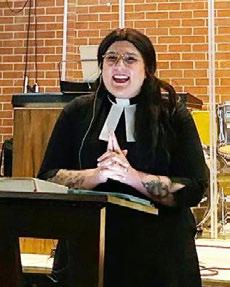
Diandra Nelson
Young adults do connect with tradition and liturgy; we just haven’t been taking the time to teach them what it all means. I did not grow up UMC, and joining a denomination with such deep traditional roots has been such a pleasure! I spend a lot of my time in the pulpit explaining church tradition and the liturgical calendar, and young people have really connected with it! When you are invited into something, you want to know all the rules, and the church has taken that for granted. I’ve been able to start a modern traditional service called The Worship Project, and a big part of that is marrying the old and the new! Old school liturgy and worship practices make a service that is unique and provides a way to celebrate the traditional church and uphold new ideas.
Impact OK2 Resident at St. Matthew United Methodist Church in Midwest City.
My advice for churches: Make sure you are ready for them when you invite people into your communities. We can assume that they will become more like us after spending time together, but we should also be prepared for the way that having them among us will change us - often for the better!
There is an idea buzzing around that young adults don’t like the Church. In some ways that is true, but I believe what they really hate is shallow cultural Christianity. People in the 18-to-35-year-old category value authenticity more than most things. I think we can see from the ministry of Jesus that he also highly values authenticity!
Another thing that young adults are in tune with that I’m not sure people realize is how sensitive we are to oppression and discrimination. Young adults are passionate about social justice issues, and making fun of us for that is not a way to make us feel welcome in a community. We also notice whom you are not including and whom you are speaking ill of. Even if we aren’t in the group of people you
It is so common for churches to invite young people in and as soon as they start acting like young people, they are SHOCKED. That’s why I think it’s important that churches are really preparing for new members. Make sure you’re praying for an open heart and open mind to all whom Christ draws near. Also, when you do get young adults - and I believe if you are earnestly praying and preparing for it you will - be prepared to give them a leadership role and a voice. The best way to learn how to attract this age group is by valuing them and letting them take the lead on connecting you with more.
I am also a seminary student working on my M. Div at Saint Paul School of Theology in OKC (it’s hosted by the OCU campus, Go Stars) and a certified candidate for ministry in the OKUMC.
Hello, I am DeRon Gabriel Sr., an ImpactOK2 resident serving at Faith United Methodist Church in Tulsa. I grew up in Midwest City and studied Music Education at Langston University. Langston’s campus Wesley was also the place I became connected with United Methodism.
Within the past year, it has been my job to connect young adults to one another in safe social spaces where young people are free from that judgmental, super-religious attitude that the traditional church has abused so many of us with. This small group church format has proven itself to be more popular and productive for the late Gen Z and early millennials that we consider today’s young adults.
Social groups, dinner groups, and Sunday school classes provide the opportunity for our different perspectives on today’s hard topics to come together and bring deeper understanding and spiritual insights, and spark the courage to make a difference.
or contemporary worship service and add some food. It’s best to spice it up and stay away from the regular way of doing church. With many leadership scandals and the political voices pushing their way in, the church as a whole has turned young adults off to the idea of being religious.
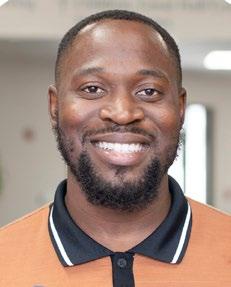
At Faith Tulsa UMC we have had a fairly successful young adult ministry. Young adults tend to be the most difficult age group to reach, given their disposition in society. They tend to be between dependent and independent adults.
This group falls between the fun and exciting youth who are forced to attend and the well-established middle aged people who have become more comfortable in life. Many of us young adults are working and in school or working and raising small children. Both leave you with little time for religious gatherings.
With this knowledge, I have made it a priority to plan things as conveniently as possible. Simple strategies like scheduling events right before or after an existing event, and staying away from weekends and high-commitment things can help your attendance with young adult ministries.
Another useful tip is to not make it similar to a traditional
In a quickly diversifying world, we have also failed to make everyone feel genuinely welcomed. We offer the invitation to come as you are but are super judgmental when we see anything different from what we believe is right. Most of us grow up hearing stories about Jesus befriending those seen unfit by societal norms, and then we see our church leadership rejecting the same type of people.
These behaviors have triggered a reflex that caused us to let go of the desire to participate. It reminds me of accidentally touching a hot stove; we don’t need much brain activity at all to pull that hand away immediately. It’s the body’s way of naturally protecting itself.
We have a generation of young adults that have left the church to protect themselves. Instead of chasing them down and forcing them to be the fuel to keep this cycle of church hurt going, we need to make some repairs to the young adult relationship with the church. I believe the movement of right-sided thinkers who work to innovate how we see church is going to be the balm that heals the church trauma we have experienced as young people.
At Faith UMC Tulsa we like to go out to trivia and enjoy drinks together or bowl. We gather for picnics at the parks, dinner potlucks, and much more social stuff because the conversations and connections we share in those spaces are an important part of our own faith walk and healing.
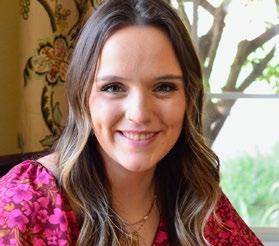
Jacqueline Guajardo, ImpactOK2 Resident at Clinton UMC in Clinton.
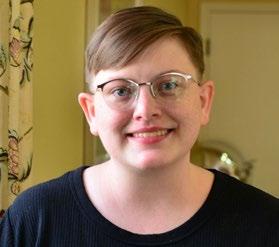
Ja’Lyn Betts, ImpactOK2 Resident at Langston Wesley foundation.
Kloe Young, Impact OK2 Resident at McFarlin UMC in Norman.
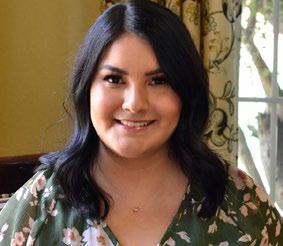
Sara Martin, ImpactOK2 Resident at Wesley UMC in Oklahoma City.
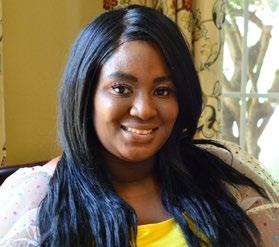
A Gen Z Adult’s Take on General Conference Legislation FRESH PERSPECTIVE
BY WANDA CLARK
I have spent my entire life in the United Methodist Church and have always seen the church as my second home. As I learned more about the Wesleyan tradition, I was hooked. Through confirmation and attending CYME (now LEAD Camp), I fell in love with all of United Methodism – from our hymns and liturgy, to Three Simple Rules, the Wesleyan Quadrilateral, and our Social Principles. A church that had methods and metrics, deep traditions, and is unafraid to address current issues? This church was made for me.
Through this love, I also found an appreciation for our systems of governance. I started attending Annual Conference as a youth delegate and later as a young adult delegate with UCO Wesley Campus Ministry. As a youth delegate, I first really learned what General Conference was and began to grasp our connectional nature. I was amazed that we not only had churches around the world, but we met together as a single body to make decisions for the whole of the church.
this decision is hard for some individuals. I want them to hear that this is a chance for us to “Do no harm,” to welcome those who were afraid to enter before, and to hear their stories. To show them the love we feel when we enter a United Methodist Church.
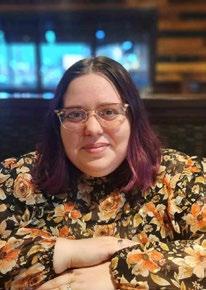
I am still trying to fully grasp that the General Conference aimed to use simple and neutral language to allow local churches and contexts to make their own decisions. This approach honors that we are an international church with diverse needs. The conference highlighted to me why the move to regionalization is so important. I do not want to lose the connectional nature of the United Methodist Church and I am excited to see us live into a reality where we can be both relational and contextual. We still have a ways to go to finalize regionalization and live into what it means to have a General Conference that can focus on the work of our worldwide connection, but I am excited to see how this unfolds.
I had the honor of watching the postponed 2020 General Conference via live stream. It was such a different experience than watching from my Wesley Foundation in 2019 or seeing clips in 2016. It was truly an act of Holy Conferencing as I watched this group of delegates work together through difficult topics, come to compromises to honor our contexts, and worship together as one body.
As we were passing legislation to finally end the condemnation of 2SLGBTQIA+ individuals, my heart was so full. Many of my friends no longer have to fear that the church will question their call because of who they love. Now, people can breathe easier knowing that the denomination they care for no longer has an asterisk on its motto “Open hearts, Open minds, Open doors.” I know
The importance of contextual ministry really hit home for me the importance of Deacons being given sacramental authority. I think we are in a time when so much of the ministry of the church happens in the go-between spaces where Deacons act as the liaison between church and the world. Giving them the ability to take our sacred practices of baptism and communion to those liminal places is another chance for us to show the love of God to all people in all places.
Overall, this General Conference was a wonderful experience and a step in the right direction. I am so honored to have watched this work unfold. I am hopeful for more conversations about accessibility and equity as we go into the future. I am hopeful for a world where we are able to love together. I am hopeful for this next stage of what it means to be United Methodist.

I’m
28 and in church every Sunday. Here’s why.
by Collin Murphy Member, Piedmont UMC
I am a recently married 28 year old. It depends on which generational break down you use, but I primarily fall into the category of millennial and would label myself as that if asked. I have been a United Methodist as long as I have been an active church goer. My family began attending church when I was in Middle school. We attended a few local churches before attending Piedmont First UMC.
It was welcoming from the start, from the then pastor down through everyone in the congregation. I joined the confirmation class at the church nearly as soon as we started attending. From those early years when my family and I first started attending the church through to my time now.
As well as being a constant in my life and a place of worship, the UMC has been a place love and compassion for all. It has been a place for myself and others to grow and deepen our own faith, but also to commune with one another and develop relationships that grow and extend to our lives outside of the church. It has been a place of community for not only the members of the church but the town itself.
I still have vivid memories of following a tornado going through Piedmont causing great devastation and loss. The church opened itself up and meals were served to those who no longer had kitchens of their own. It also opened to all those from Piedmont and beyond that came to aid in the cleanup and recovery.
strengthen my bond and attendance to the church and God.
I think one the biggest misconceptions about young people and the church is that young people don’t want to attend or be a part of the church. I think lots of young folks - myself included - when they move away for things like college or jobs or any number of things, can get overwhelmed and swept up with the new environment. This can often cause their attendance to church to slip, but I believe it is a much rarer instance that it causes their faith to slip. I think, often, young people need the church to make the first move.
I am not sure what would cause me to leave the church; it is not something I have ever put a great amount of thought into before this moment. For myself, the first thing that comes to mind is if I were to look at the UMC and no longer see the motto of, “Open hearts, open doors, open minds” being lived out. That would definitely, at the very least, give me pause. It’s not just that motto, but seeing the church and its members live it out - that is one of the things that drew my family to the UMC in the first place. It is without question one of the major points of my continued involvement with the church.
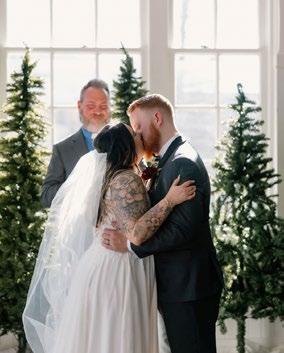
Personally, some of the things I get from going to church are obviously the continued growth and strengthening of my faith, as well as - although it may seem silly to some - a constant and continual part of my week, that helps provide some structure and steadiness to my life. This is very appreciated in the moments when it feels as though the rest of my life is going a million different directions at once. The worship experience and the people of the church help to anchor me, which only goes to help
I plan to continue to attend and grow in my faith, not just through my local church but also through a local Young Methodist group that was started by a former district superintendent.
This gives me an opportunity to grow and share experiences with other Methodist young adults. It is a great opportunity to strengthen our bonds with each other, the church, and our faith. There are also lots of great “lower pressure” opportunities to invite others without their feeling the pressure of having to attend a service or sometimes even go to physical church building at all.
Habits of Generation Z Your Church Might Be Ignoring
by Dillon Smith, a member of Gen
Z and former member of Carey
Nieuwhof Communications.
Printed with permission.
There’s no doubt that Gen Z has some different habits than previous generations.
Thanks to the Internet and smartphones, the environment that we’ve grown up in is completely unique and unlike any generation before.
We spend more time online, go outside less, and care about wildly different things than our parents did when they were kids.
You might look at these habits and think that these habits are “just a phase” or that we’ll “grow out of it.”
We won’t.
At the time I’m writing, I’m 22 and I still watch A TON of YouTube. Even post-graduation, my classmates still spend
a lot of time on Instagram and TikTok. None of us plan on making any of these a smaller part of our lives.
So for the church: How do you become a bigger part of our lives online?
Well, first, I think you need to be aware of how and why we behave and think the way we do.
I’m seeing seven habits of Generation Z that your church might be ignoring. Here’s the list:
1. I watch who I want, when I want
The Internet has given me the freedom to watch exactly who I want, when I want.
So, the only reason my friends or I are watching your
church online is either because our parents are making us, or because we deeply care about what you have to say.
There are just too many other appealing ways to pass the time for us to waste our time on something that isn’t helpful or fun to watch.
So what does this mean for teaching pastors and service programming directors?
10 seconds of boring is enough to lose a Gen Z viewer. Every second of online content you produce needs to add value in an efficient and engaging way.
2. If you want me to follow you for a long time, I need to get to know you
Our spirituality is one of the most sacred and private things we have, and if you want Gen Z to trust you with our time, we need to trust you.
to function anyway.
4. Gen Z would prefer to avoid our parent’s generation on social media
When I look back at my time in school, new social media apps like Vine, YikYak, Kik, and TikTok would come up in popularity in phases.
The life cycle of a new app would look like this:
Step 1. A new app would release.
Step 2. It would become popular because our parents had no idea about it yet.
Step 3. Our parents would find out about it and create an account or have the school block it.
Step 4. We would all abandon it for the next app.
Step 5. Repeat.
“Sadly, a sermon series once a year isn’t enough to reach a generation plagued with anxiety. The church needs a better solution.”
And, a weekly sermon just doesn’t cut it for us. In this digital era, churches should be producing more personal content online, not less. There are tons of Twitch streamers and YouTubers who are doing this well. As church leaders, it’s about time that we start learning from them.
Lead pastors could take the vlog camera home and show some of how they parent, or the staff could bring the vlog to worship practice or community service projects to show how the church is run throughout the week. It’s just an idea, but ideas like this are going to reach my generation.
3. I’ve been trained to view myself as a brand
Thanks to platforms like Instagram, YouTube, and TikTok, I’ve grown up viewing myself as my own brand. I don’t think this mindset is healthy, but I do think it’s accurate. And as the church, we’re called to reach people where they actually are, not where we would hope they’d be.
If you want to reach a “me-centered” generation, show us what’s in it for us.
One Biblical angle to take with this is to change your church’s focus from the Sunday experience to what the church is doing throughout the week. Show us how we can join your movement and not just build your platform. This might be a bit closer to how the church was designed
I think this is part of why TikTok exploded like it did, and why many of the young people I know are spending less time on Facebook and Instagram and more time on TikTok. It’s still cool to avoid our parents’ generation online.
So, for you and your church, I’ve got a few strategies to think about:
• Even as new apps become popular, I still follow one influencer on Instagram and YouTube. I follow him because I trust him, and I’ll still watch him on those platforms because I know he’ll be there. If you’re a senior pastor, stick to where your people know you are, and double down.
• For taking new ground on new apps (like TikTok), let a young staff member or young volunteer take the lead. Let the student ministry put effort toward experimental apps, and as the average age of an app’s users increases, begin to add adult-focused content.
• No matter how old you are, don’t try to be someone you aren’t. If I see [a Boomer leader] dancing on TikTok tomorrow, I’m going to be more concerned and less likely to follow him. No matter the platform, being authentically you is the best way forward.
5. Diversity isn’t optional
A couple of years ago, Greg Atkinson told me that if you want to reach the next generation, having a diverse church isn’t optional. He’s right.
Our schools are diverse, our workplaces are diverse, and
our friend groups are diverse. If your church isn’t at least as diverse as the school we grew up in, we will question you as an organization.
As Derwin Gray and Darryn Scheske pointed out on a recent ChurchPulse Weekly podcast episode, “Young adults aren’t leaving the church; they’re leaving the white church.”
6. My mental health issues aren’t going away
One of the biggest issues facing the next generation is a sharp decline in mental health.
Here’s the strange part: We’re fully aware of the mental health crisis, and what’s causing it, but our phones are too good to give up. The rewards of the Internet outweigh the risks for us.
So, how can you help?
Sadly, a sermon series once a year isn’t enough to reach a generation plagued with anxiety. The church needs a better solution.
Maybe it’s opening a counseling wing attached to your church. Maybe it’s making mental health a regular focus of your young adult ministry or small group or something else entirely. Whatever it is, this is a felt need that we have year-round that the church can’t ignore.
or not, you’ll need to apologize to most of the next generation first.
I wish this weren’t true. And I wish it were just an isolated thing, but it’s not.
As evidence that this wasn’t just my experience, I posted a tweet last week in a moment of stress that I would not be so quick to post again. The tweet said:
“As a 22-year old Christian, too often it feels like I’m a Christian in spite of the Church rather than because of the church.”
Again, if I could go back in time I don’t think I’d tweet this again, but one thing that shocked me was the response I saw.
It was by far the most liked and retweeted tweet I’ve ever shared.

7. When I talk to my non-Christian friends about church, I usually need to lead with an apology
During my first couple of years of bible college, I was a server and bartender at a restaurant in downtown Omaha. All but two of my coworkers were 16 to 30-year-olds who were either atheist or agnostic, and almost all of them had stories about how the church had hurt them or their families.
So, if I wanted to have any form of evangelistic or spiritual conversation with them, I had to first apologize (for something I had nothing to do with) and convince them that not every Christian is judgmental or abusive. This is true for most of the people my age. If the church wants to reach the next generation, justified
And you know who did nearly all of the liking and retweeting?
Gen Z Christians. They responded with things like, “Oof, I feel this.”
“This is sadly true.”
“Same.”
“I would share if I didn’t think it would create a storm I’m not prepared to tackle.”
This massive response tells me that the emotion I was feeling when I originally posted the tweet is hitting a chord with the rest of my generation. It’s telling me that the tweet might be more right than I know.
As the Church, we need to get ahead of this.
We need to follow Jeff Henderson’s advice and make sure our communities know what we’re FOR rather than what we’re against, and we need to apologize to those we’ve hurt, even if it wasn’t us who did it.
If we don’t do this, more and more irrelevance and hate await the Bride of Christ.
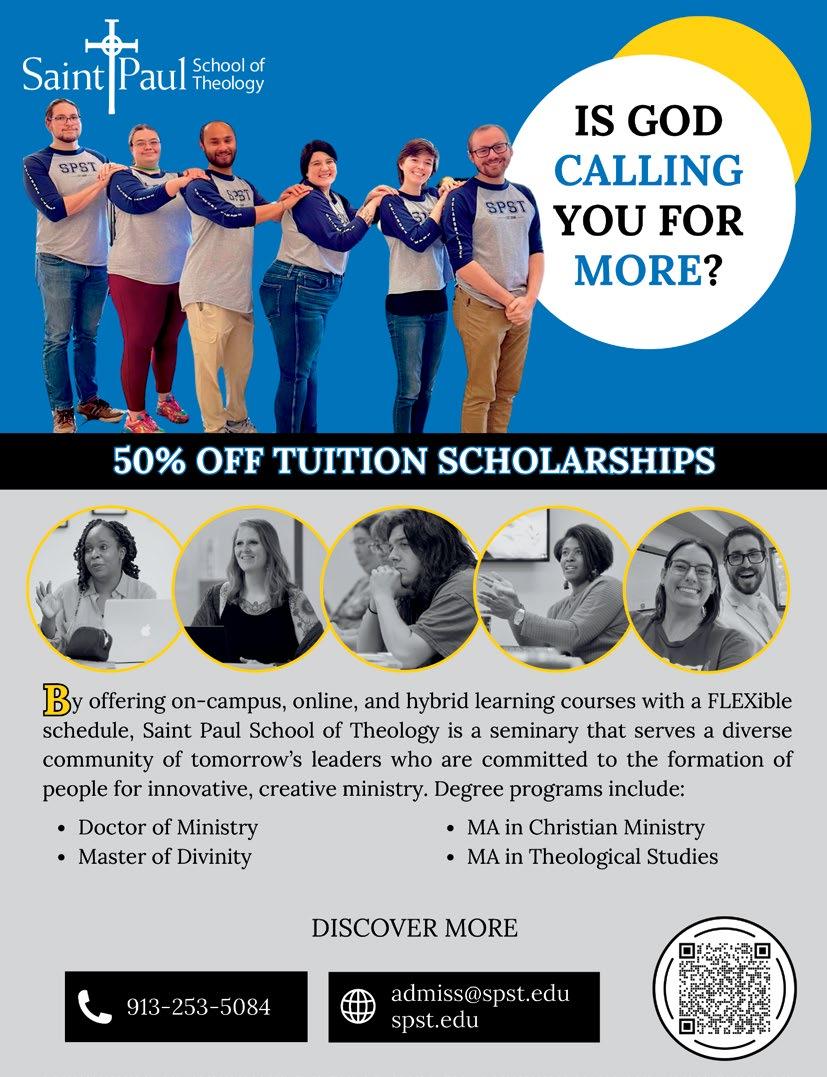
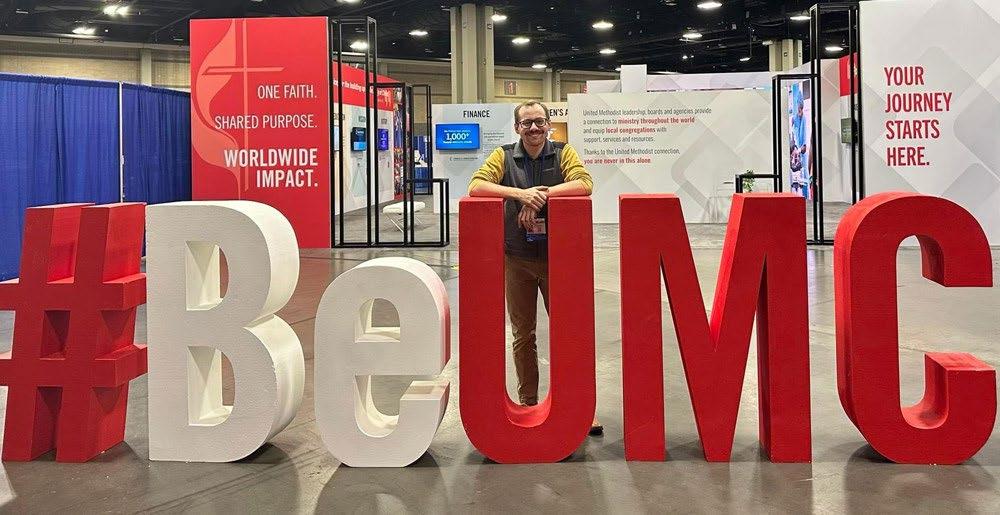
BY COREY SHIREY
Tying It All Together Finding Common Ground
The year was 1998. I was three years old. It was Easter Sunday and I remember this story clearly.
I was sitting next to my young dad in the very first pew of the Church of God in Shamrock, Texas. My younger mom was up on the stage playing piano.
I was being just as rambunctious as anyone would expect a threeyear-old boy to be, and my dad was struggling to keep me “under control” without causing a major disruption. Directly behind me was one of the kindest people I have ever had the pleasure of knowing. Her name was Issabelle Peace,
and she was 93 years old.
Having raised several children, with grandkids and great grandkids, she could tell how I was about to become too much for my dad to handle quietly. Without hesitation, she reached over the pew, tapped me on the shoulder, and handed me a hand-tied bag of homemade chocolates.
I know what you must be thinking at this point: how on earth could she think it would be a good idea to give a hyperactive three-yearold a bag of chocolate?
I remind you that the bag was tied.
In her mind, it was going to take me quite a while to figure out how to untie the very tight knot that she had tied - hopefully, long enough for my mom to come to the rescue.
I had other ideas. Immediately upon figuring out that I wasn’t going to be able to untie her knot, I jumped up ran up the stage straight to my mom, right in the middle of the chorus to “I’ll Fly Away”. Ironic, I know.
Obviously, since my mom was playing the piano right in the middle of a hymn, a look of panic set in on her face. Seeing that
look, an older gentleman on the stage quickly picked me up and sat me in the chair right next to him. He untied the bag and began dispensing the chocolate to me, one piece at a time. This man sat right next to me and kept me content until the service was over.
Fast forward a few years. I was 22 years old, attending college at NWOSU in Alva, Oklahoma, living in The Wesley Foundation. Every Thursday an area church would bring us students a home-cooked lunch. This day, a group from Alva FUMC, consisting of women who were at least 40 years older than the majority of the students, fed us.
This generational gap made very little, if any, difference to the genuine love, joy, and laughter we shared over that meal. While these women served us food, they told us stories and jokes, asked about our lives, and showed us the love that Christ commands each of us to share with our neighbor.
What do these two stories have in common?
They dispel the myth that younger generations cannot have genuine relationships with those from generations before us.
My parents were young, just old enough to not be kids themselves. And I was very much still a child. However, this divide made no difference to those two older individuals. They saw a need and acted immediately.
In college, though I did not know it at the time, I was in real need of sincere connections with others
who genuinely wanted to know how I was doing. I needed real connections with people who wanted nothing more than to show me love.
Today, at nearly 29, I’m the Executive Director and Campus Minister of The SWOSU Wesley Foundation. Nearly every day I work and do ministry with young college students.
I am just one person. As we all know from our own local churches and ministry settings, it takes more than one person to make something work well. Enter my Board of Directors.
The SWOSU Wesley board is truly inter-generational. The members of this board consist of people who are in their 70s all the way down to their 20s - and it is a truly wellfunctioning group of people with one vision and one focus: to love each student who comes through our doors with the love of Jesus Christ. And they do it well.
In today’s world of constant complaints about generational gaps, one could reasonably ask: What makes this inter-generational group of people work so well together?
The answer is quiet simple. We found our common ground.
Are there differences in how we approach situations? Sure. Are there references we each make that just do not connect? Absolutely. I still to this day have not seen a floppy disk in person. The only typewriter I have touched was in an antique shop.
However, when we decided to focus and find what unites us, we discovered that it is far stronger than what differences we may have. And that common ground, that strength that unites us, is Jesus Christ.
In Matthew 22:37-39, Jesus tells us that the greatest commandments are to love God and love people. This statement from Christ has become our ethos, our calling card of sorts. It is on our Wesley t-shirts, advertising, and swag. Having those words, “Love God & Love People,” printed everywhere reminds us not only why we do what we do, but how to do it.
In this season of change for not only our conference, but our entire denomination, we must remind ourselves that regardless of generational differences or what society says when it tells us that there is nothing uniting the young and the more mature, and regardless of our preconceived notions, we must work together to find common ground.
No one generation can do it alone. Only by building inter-generational bridges will we truly live into our United Methodist mission of “making disciples of Jesus Christ for the transformation of the World”. When we decide to make that our common ground, we will see what a real revival looks like.
a publication of
